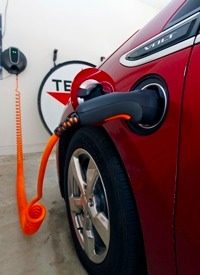
During a government investigation into the safety of Chevy’s electric cars, three fires broke out days after side-impact crash tests were administered. GM officials, however, insisted that there is no threat of fires immediately following car crashes, as the fires occurred seven days to three weeks after the National Highway Traffic Safety Administration (NHTSA) performed the tests.
The crash tests punctured the cases of the batteries, and leaking battery coolant could have spurred the delayed ignition in the regulators’ undrained Volt batteries, Chevy spokesman Rob Peterson suggested. But Chevy is not planning a battry storage redesign at the moment. Considering that the fires did not occur until days later, some GM officials alleged that the crashed Volts were not stored properly. Still, the NHTSA has launched a safety probe into the battery malfunctions and has requested that other electric car manufacturers submit battery testing data as well.
"The fire broke out seven days later. Not seven minutes. Not seven seconds," Akerson averred, adding that GM is notified of any Volt crash through its OnStar system and dispatches a safety crew within 48 hours to drain the battery — which the automaker claims will temper the likelihood of a fire. "I think in the interest of General Motors, the industry, the electrification of the car, it’s best to get it right now than when you have — instead of 6,000 — 60,000 or 600,000 cars on the road."
Moreover, Akerson indicated that GM is willing to recall the more than 6,000 Volts now on the streets and repair them once the company’s engineers and federal safety regulators determine the cause of the fires. "If we find that is the solution, we will retrofit every one of them," the CEO asserted, and if changes to the Volt’s 435-pound battery pack are recommended by federal officials then modifications will be made.
"We want to assure the safety of our customers, of our buyers, and so we’re just going to take a time out, if you will, in terms of redesigning the battery possibly," Akerson said in an interview with Reuters. However, it is not clear whether GM would be pursuing engineering changes to the battery in the current product cycle or in the next product cycle.
"It is a safe car," Akerson reiterated to Reuters. "We just want to make sure that there are protocols post-crash. We want to make sure all the Ts are crossed, the Is are dotted, and no one has any question about the car long-term."
Chevy spokeswoman Michelle Bunker, who handles Volt matters, disputed allegations that GM is trying to save face with its seemingly generous rebate, as she stated, "This is not ‘new news.’ This is one and the same" as the loaner car offer GM announced Monday. Bunker said the Monday announcement contained a pledge that "if something escalated so that the customer wanted us to buy back their car, we’d do it. It’s just a part of owner satisfaction."
Ironically, GM’s bold offer arrived the same day that Consumer Reports magazine released a report naming Chevy Volt owners the "most-satisfied" vehicle owners in the United States, as a whopping 93 percent said they would buy one again. However the survey was conducted before the NHTSA came to its heated conclusions. Regardless of the investigation’s merits, the "most-satisfied" label tagged by Consumer Reports could soon be deemed void by public opinion, some critics note. Worse, Chevy’s Volt sales may plunge, abating the already paling batch of cars now electrifying the streets.
GM had previously set a goal to build 10,000 Volts for sale in the United States this year, a target the automaker came well short of — nearly 4,000 shy of its 2011 goal — although GM executives have blamed lagging sales partially on distribution problems: Consumers who wanted certain models couldn't get them because dealers weren't allowed to sell their demo models. And analysts suggest that recent developments will only make GM’s goal to dominate the electric car market even more far-reaching.
Photo of Chevy Volt being charged: AP Images


